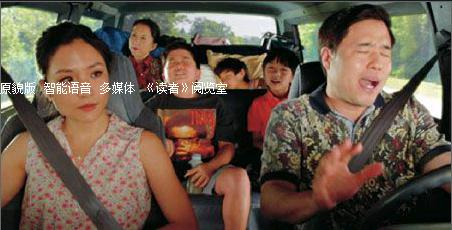Fresh on the Screen
2015-03-24ByKyleeMcIntyre
By+Kylee+McIntyre

For the first time since 1994s All-American Girl, American television has a primetime show starring an Asian American family. Fresh Off the Boat, based on Chef Eddie Huangs real-life memoirs about growing up with immigrant parents who had moved from Chinas Taiwan, is a new ABC network comedy, and its rapidly gaining attention, particularly among children of Asian immigrant parents excited to see their stories on screen.
Starring Randall Park, Constance Wu and Hudson Yang, Fresh Off the Boat is indeed a fresh addition to primetime comedy—and not just because of its cast. The Huang familys 1995 move from a predominantly Chinese immigrant community in Washington, D.C. to a predominantly white community in Orlando, Florida, is characterized by a 90s hip-hopdominated soundtrack (Eddie Huang, Yangs 10-year-old main character, is a huge fan of the genre) and light, wry humor, amplified by Park and Wus gloriously understated line delivery.
Throughout the watch, the show peppers the 25-minute episodes with references to the year 1995. Janet Jacksons racy Rolling Stone cover and the OJ Simpson trial make brief appearances, just long enough to characterize the time, but Fresh Off the Boat is not a period piece. It is, at its heart, about a family struggling to stick together and makes things work, but it quietly sets itself apart with great comedic timing and characters that are quirky in the best way.
Channeling diversity
Each episode features a background narration by none other than the real-life Eddie Huang, in a move that is reminiscent of Everybody Hates Chris, a comedy detailing comedian Chris Rocks childhood which, like the later show, is narrated by the subject of the memoirs upon which the program is based. Like Rock, Huang sets scenes up and provides context to the story. The family on the show has six members—father Louis, who has completely bought into the American Dream and moves the family to start an American barbeque business in Orlando; mother Jessica, who remains wary of the business (which is not doing well) and white American culture in general; Grandma, who always has a zinger in Mandarin ready; and three sons—Eddie, whos trying to fit in at his school; Emery, a mamas boy who seems to excel at everything he does, and Evan, the carefree youngest son who spends a lot of time with his grandma. Through these characters, Fresh Off the Boat sets up a depiction of the Asian immigrant family experience that spans three generations.
When Neil Patrick Harris cracked a joke at this years Oscar Awards—“Tonight, we celebrate Hollywoods whitest—I mean brightest”—he was met with knowing laughter from the audience and from several watching the awards show around the world. Its a simple truth that the majority of American television shows star white actors as a default. Characters of color are often slid into the spot of “best friend” or “comic relief.”Thats never a problem on Fresh Off the Boat.
Indeed, when the trailer came out for the show last summer, it was slated to begin in the fall but was delayed until spring. Even before the show aired, fans rallied around the show to support it. The shows original title was going to be Far East Orlando, but a Twitter campaign by Asian Americans, led by Huang, rallied for the show to change its name to Fresh Off the Boat. The nickname is a tongue-in-cheek term used mostly by East Asian immigrants to describe those among their number who have only recently emigrated abroad.
The show does a great job of keeping away from stereotypical Asian jokes, the kind of derogatory race-driven humor that graces a lot of American comedy. Tropes such as jokes based on accents and kids being pushed really hard by their parents do make up parts of Fresh Off the Boat, but theyre employed as devices for characterization—not punch lines. Seven episodes into its first season, it seems that Fresh Off the Boat doesnt so much just sidestep those tropes as reclaim them, in much the same way that its fans claimed the shows title for themselves.
When I first saw the trailer for Fresh Off the Boat this summer, I nearly fell over myself trying to run into the kitchen with my laptop to tell my mother. As an Asian-American, so many of the jokes resonated with me. Though I belong to the tail end of Eddies generation (I was three years old in 1995), I am a 90s child. Like Eddie, I remember kids at school getting weirded out at the food my mother chose to pack for me for lunch. Watching the trailer, my mother was laughing out loud because, like Jessica, she was equal parts fascinated and confused by trying to fit into white American culture, particularly white American female culture.
Target audience
I also talked to other fans of the show who could relate to its themes.
“Its about an all-Asian [Chinese] family living in America in the 90s. Like, thats literally a show about my life,” said Chi, who is Vietnamese American. “The music and the clothing and everything just set me back to my childhood. Im actually a huge fan of 90s hip-hop, so its good to hear that its making a comeback via this show.”
I asked her what her favorite part of the show was, and she immediately brought up the shows fourth episode, titled Success Perm, in which Jessicas sister Connie and her husband come to visit the Huangs after their move from DC. Hilarity ensues when each family tries to prove theyre the more successful clan, and in the process, Louis and Jessica both get perms.
“They do ‘Asian things,” said Chi. “[Perms] are a sign of you doing well in your life, and to me, that was just so hilarious. Thats a thing that Asians dont really talk about, but I know that they are 100-percent factual statements.”
She also pinpointed an episode in which Huang explains why his family never tells each other they love each other. Theyd rather show it rather than tell each other about it.
“[In my experience], thats pretty true as well. Asian American families never publicly display their love for one another, so when you see your parents holding hands, thats actually really intimate. Saying ‘I love you is just unheard of unless you want something,” said Chi.
Coincidentally, in the episode Chi references, Eddie realizes something strange is happening with his fathers restaurant because his father uncharacteristically says “love you!”
Thomas, who, like Eddie, grew up American to two immigrant parents from Taiwan, started watching the show because he wanted to see how accurately the show told its story. He was impressed with the results.
“I think literally each of the five episodes I watched [so far] had me in at least one ‘war flashback moment,” said Thomas, “where literally whatever was unfolding on the screen I could relate to a personal experience of my own.”
He, too, cites the Success Perm episode as one of his favorites.
“The second I saw the titular success perm, I just about lost it. I had to pause the episode to breathe from the laughter. [My friends] were both very confused, so I grabbed a family portrait from the living room to show them my moms own ‘success perm,” he said.
Thomas has frequent watch parties for Fresh Off the Boat with his friends, neither of whom are Asian-American. The show helps them learn about his family, the immigrant experience, and, according to Thomas, its just entertaining.
Sam, one of those friends, also really enjoys the show for the writing and its characters. He names Jessica as his favorite character and admires her self-love and self-respect. Originally, though, he started watching the show for the diversity of its cast.
“I love the fact that the writers are able to avoid the trap of making the show all about diversity and the Huang familys ethnicity. I think when you have a show thats heralded as an important milestone in representation, its hard not to give into the pressure of representing every single member of the people youre representing. I think where the show succeeds most is in their being able to avoid making a hollow, preachy show, and instead making a well-written show that shows an honest portrayal of life in an ethnic minority,” said Sam.
As for what they expect to see in the future, the response is unanimous: more. More Asian American shows on television and more episodes of Fresh Off the Boat.
“I need to see where theyre going to take the show,” Thomas said. “What else are they going to make a jab at? How is the family going to survive? These are things I need to know!”
